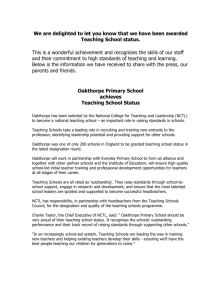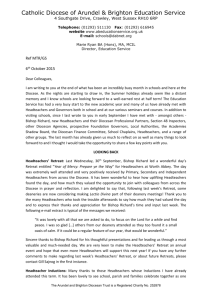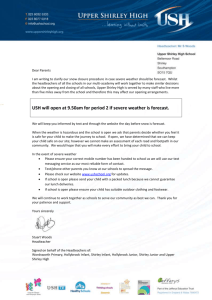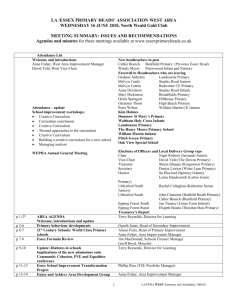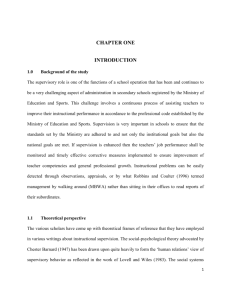Standards and Achievement Service
advertisement
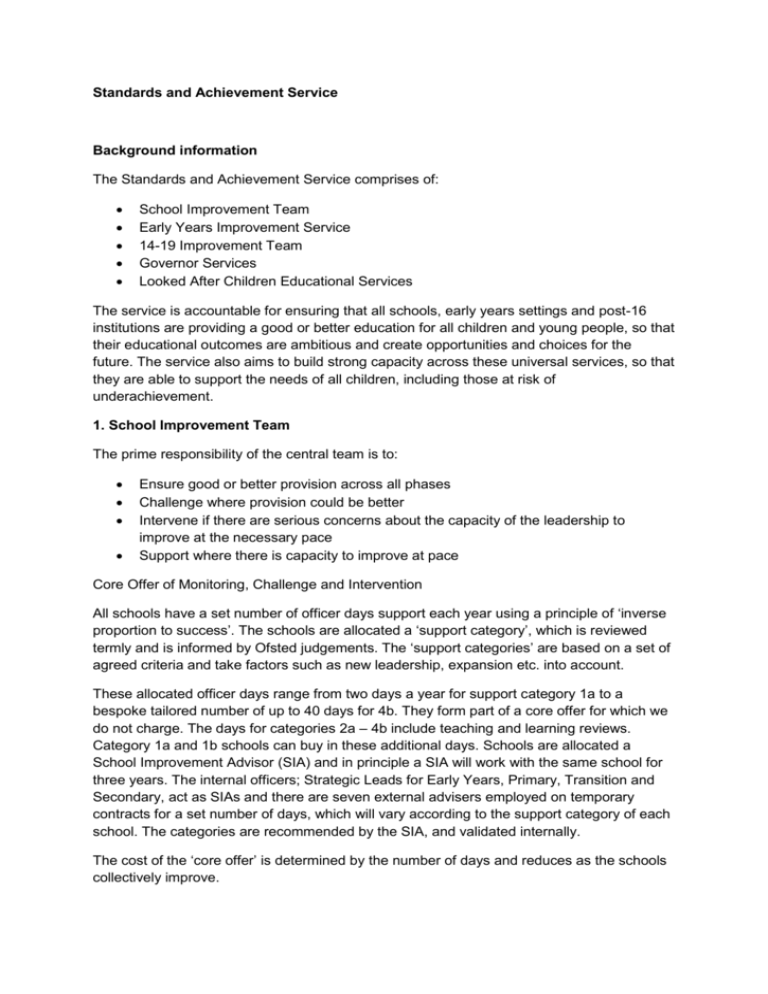
Standards and Achievement Service Background information The Standards and Achievement Service comprises of: School Improvement Team Early Years Improvement Service 14-19 Improvement Team Governor Services Looked After Children Educational Services The service is accountable for ensuring that all schools, early years settings and post-16 institutions are providing a good or better education for all children and young people, so that their educational outcomes are ambitious and create opportunities and choices for the future. The service also aims to build strong capacity across these universal services, so that they are able to support the needs of all children, including those at risk of underachievement. 1. School Improvement Team The prime responsibility of the central team is to: Ensure good or better provision across all phases Challenge where provision could be better Intervene if there are serious concerns about the capacity of the leadership to improve at the necessary pace Support where there is capacity to improve at pace Core Offer of Monitoring, Challenge and Intervention All schools have a set number of officer days support each year using a principle of ‘inverse proportion to success’. The schools are allocated a ‘support category’, which is reviewed termly and is informed by Ofsted judgements. The ‘support categories’ are based on a set of agreed criteria and take factors such as new leadership, expansion etc. into account. These allocated officer days range from two days a year for support category 1a to a bespoke tailored number of up to 40 days for 4b. They form part of a core offer for which we do not charge. The days for categories 2a – 4b include teaching and learning reviews. Category 1a and 1b schools can buy in these additional days. Schools are allocated a School Improvement Advisor (SIA) and in principle a SIA will work with the same school for three years. The internal officers; Strategic Leads for Early Years, Primary, Transition and Secondary, act as SIAs and there are seven external advisers employed on temporary contracts for a set number of days, which will vary according to the support category of each school. The categories are recommended by the SIA, and validated internally. The cost of the ‘core offer’ is determined by the number of days and reduces as the schools collectively improve. Neighbouring local authorities who have either moved to a fully traded service for all schools or solely for ‘outstanding’ schools have reported that schools have slipped into either LA or Ofsted ‘causing concern’ categories in a relatively short period of time and they have subsequently re-instated a core offer as the financial costs of recovery are higher than ‘maintenance’ and the negative impact on children’s outcomes are long lasting. Interventions The Council takes its statutory duty seriously to intervene where standards are in need of rapid improvement and there is not the capacity within the school to effect change at pace. There is a directorate School Recovery Board in place that reviews the Schools Causing Concern on a termly basis, with input from all services within CYP. This then feeds into a termly meeting of the Head of S&A, with Strategic Leaders and the Executive Director to review progress of Schools Causing Concern, succession planning and other issues arising. There have been a high number of interventions, which have taken place by working in partnership with governing bodies. The local authority has issued two Warning Notices and set up four IEBs over the past five years. Balance between maintaining central staff, use of external advisers and leadership within schools The shift has been to one of ‘intelligent accountability’ where the role of the Council is to commission quality of provision rather than try to provide it. In Lewisham, the strategy to use the very best headteachers to lead more than one school has been highly successful across the primary sector both in improving individual schools and raising standards across the board. Primary school outcomes have now been in the top 10 in the country for two years running. The structure of the central school improvement team has been significantly reduced in size and predominantly top heavy to reflect the need for strategic leadership and the expectation that schools are responsible for their own projects/professional development programmes. We have recently recruited two additional posts to support the primary and secondary school improvement work. The Strategic Leads are themselves successful school leaders and Ofsted trained. They also deliver the additional strategic functions of: Headteacher recruitment Intervention & trouble shooting Partnership/Federation brokerage Strategic Partnership working Good working relationships are paramount to enable them to perform these functions effectively. External staff are engaged for a set number of days to deliver the Monitoring and Challenge programme in schools. These advisers can be replaced when the agenda shifts or their skills set is out of date. Costs remain low as they are only bought in for the minimum required time. This approach is supported by senior officers and the funding allocated is currently agreed. The costs of central staff delivering interventions in the past have been high and not always successful. Through robust interventions where the leadership and the governing bodies have been removed, where necessary, and replaced by outstanding school leaders running more than one school, the costs have been much lower and the impact greater. Additional areas There are a small number of staff who are employed to cover specific statutory areas: Newly Qualified Teacher Appropriate Body (to enable NQTs to become fully qualified we must validate schools’ monitoring & evaluation processes); School Assessment Moderation of Primary Tests and Elective Home Education (we have a duty to ensure that the education received is appropriate); support for SACRE, both clerking and advising. 2. Early Years Improvement Service We have maintained a small but high quality improvement service of 5 specialist advisors. They work across all early years settings and providers, including PVIs, childminders and schools to both encourage more providers to take targeted 2 year olds in addition to improving the quality of that provision. They also work with schools in reception classes, supporting transition from nurseries and into Key Stage 1. There are two nursery schools in Lewisham, both graded by Ofsted as Outstanding, Chelwood and Clyde. Chelwood has recently been granted Teaching School Status and we are negotiating with them areas that they may lead on. 3. 14 – 19 School Improvement Team We have a key role to ensure that there is adequate provision for our young people, as they move through their education. We want to commission from our local providers where possible. This includes the commissioning of alternative educational provision, such as vocational courses for 14-16 year olds. The current status of Lewisham and Southwark College (judged by Ofsted to be inadequate) is a priority. We have maintained a small team which is comprised of a Strategic Lead and a small group of officers. 4. Governor Services This has moved to be a fully traded service and the majority of schools buy in to the LA Service. The Service has a Head of Service and one full time officer, plus a number of clerks. The service supports the Lewisham Governor Association and provides useful documents and guidance to all governing bodies. We also identify Local Authority Governors to join governing bodies or be nominated to join governing bodies under the new legislation. 5. Looked After Children Educational Services We have a Virtual Head in post with a team of specialists. The Head is currently reviewing the structure of the team. There is a Governing Body for the Virtual School, chaired by an ex-headteacher, with Member, headteacher and foster carer representation. Meetings with headteachers The Executive Director for CYP has a termly meeting with headteachers. This takes place for a morning each term. It takes place in schools and deals with news, key areas and sharing best practice to raise standards. The primary headteachers meet with council officers at the Primary Strategic Group on a half-termly basis. The secondary headteachers meet three times a term and council officers attend part of those meetings for specific items and updates. Special school headteachers attend phase meetings and also have their own Special heads consultative where they meet half-termly. The primary headteachers used to have a Primary Consultative, which has now evolved into a cross-phase Leadership Forum. They have planned two meetings termly, where one is a business meeting and they intend to invite guest speakers to the other. They have had one ‘horizon-scanning’ meeting, which was well-attended. The secondary headteachers have set up a working party to work with council officers on a Raising Attainment Plan and there is strong commitment from all secondary heads to raise attainment across all schools. Key outcomes The EYFS (Early Years Foundation Stage 3, for 0-5) outcomes have been steadily improving at a faster rate than national. In 2013, the assessment framework changed significantly and our outcomes rose to be close to the top in the whole country, both for all children and those termed as ‘disadvantaged’ (those eligible for Free School meals and those Looked After) Key Stage 1 (aged 5-7): have remained at the same or just below national averages. In 2013, this shifted and the outcomes were above national in all measures for the first time and this upward trajectory continued into 2014. Key Stage 2 (aged 7-11): results have been rising well. There was a significant stepchange in 2010 and steady improvements since then. For the expected Level 4 in reading, writing and maths, Lewisham schools were ranked as 4th in the country. Level 5s in reading, writing, and maths have also increased, but the gap for ‘disadvantaged’ pupils is not closing as fast as we would like. Key Stage 4: Results dropped more than the national drop and the local authority rank against statistical neighbours is bottom. This has been an area that politicians are now very involved in. Key Stage 5: Outcomes across post-16 institutions continue to match national at the A-level pass rates, but are below national for the higher grades. As with KS4, this is a priority. However, there has been an increase in the number of young people who have gone on to top universities and a decrease in the number who are NEET.



